Laser Etching and Engraving Glass: Best Machine, Steps and Ideas
Glass etching is a fascinating art form that has been around for centuries, allowing artists and hobbyists to create stunning designs on various glass surfaces.
With the advent of modern technology, laser engravers have emerged as a powerful tool for engraving and etching intricate, precise, and consistent designs on glass.

In this comprehensive guide, we'll delve into the process of laser etching glass, discuss the advantages it offers over traditional methods, and provide step-by-step instructions for achieving beautiful glass etching results. We'll also cover a range of creative glass etching ideas and help you choose the best laser glass etching machine for your needs.
In This Article
- What is Glass Etching?
- What's the Best Laser Engraver for Glass Etching?
- Advantages of Laser Etching and Engraving Glass
- How to Engrave Glass with a Laser Engraver?
- Top Glass Laser Engraving and Etching Ideas
- FAQs of Laser Etching and Engraving Glass
- Conclusion
What is Glass Etching?
Glass etching is the process of creating decorative designs, patterns, or images on the surface of glass by removing a small amount of material. Various techniques have been developed to etch glass, ranging from traditional to modern methods.
Traditional Glass Etching Methods
Acid etching: Involves the use of hydrofluoric acid to dissolve the surface of the glass, creating a frosted appearance. This method can be dangerous due to the highly corrosive nature of the acid.
Sandblasting: Requires the use of high-pressure air to propel abrasive materials like sand or silicon carbide against the glass surface, resulting in a rough, frosted texture. Sandblasting offers more control over the depth and appearance of the etching but can be messy and requires specialized equipment.
Glass etching cream: A more accessible and safer alternative to acid etching, glass etching cream contains a mixture of chemicals that react with the glass surface to create a frosted appearance. This method is popular among DIY enthusiasts and hobbyists as it can be easily applied with a brush or stencil and requires minimal equipment.
RELATED: How to etch glass with etching cream?
Modern Glass Etching Method
Modern glass etching techniques have evolved with the advent of advanced technology, leading to the introduction of laser etching and engraving.
How Does a Glass Laser Engraver Work?
Laser etching and laser engraving utilize a focused beam of light to create a precise and intricate design on the glass surface.
The laser beam carries intense heat that rapidly locally vaporizes the glass surface, removing small amounts of material.
The movement of the laser beam is controlled by computer software, ensuring precise and accurate engraving according to the design or pattern imported into the software.
What is the Difference between Laser Etching and Engraving Glass?
The terms "etching" and "engraving" are often used interchangeably, but they differ slightly in the depth of the mark made on the glass. Etching is generally shallower, while engraving creates deeper marks.
What's the Best Laser Engraver for Glass Etching?
Before diving into the best laser engraver for glass, it's essential to understand the types of laser engravers that can etch and engrave glass.
The best type of laser engraver for glass etching is the CO2 laser engraver.
CO2 lasers are widely used for etching and engraving various non-metal materials, including glass, wood, acrylic, leather and more. They work by producing an infrared beam, which is readily absorbed by glass and causes the material to vaporize, resulting in the engraved design.
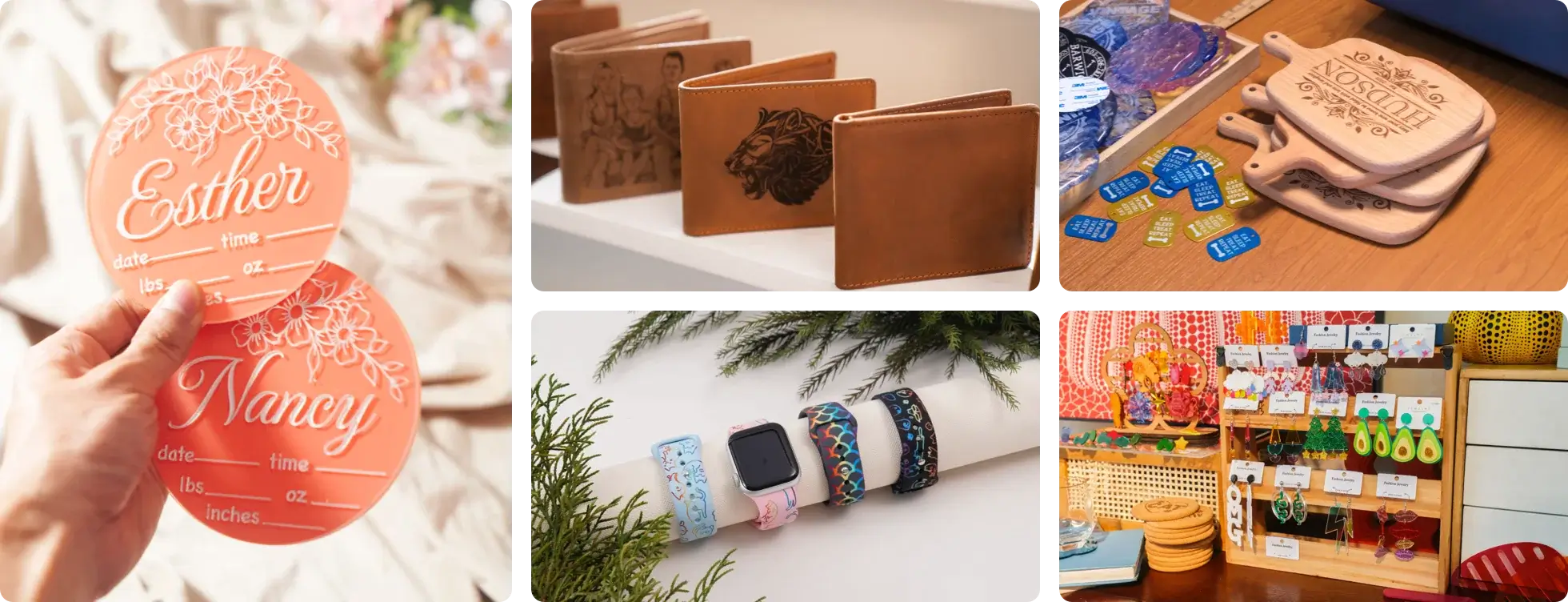

XTOOL P2
CO2 Laser Engraver for Glass
Best desktop CO2 laser engraver that is safe and easy for home use. Especially ideal for business projects.
Learn MoreDiode laser engravers can also effectively etch or engrave glass, offering an alternative to CO2 laser engravers. Diode lasers are generally more compact and budget-friendly, making them an appealing choice for hobbyists and small businesses looking to explore glass etching without a significant upfront investment.

XTOOLF1
Fastest Portable Diode Laser Engraver for Glass
With its max. engraving speed of 4,000mm/s and handheld design, f1 excels at on-site engraving projects.
Learn MorexTool P2: the Best CO2 Laser Engraver for Glass Etching
The xTool P2 is a groundbreaking CO2 laser engraver that brings advanced features and capabilities to the world of glass engraving.
Let's explore the exceptional features of the xTool P2 and how they make it the perfect choice for glass etching.
Extensive Material Compatibility
The xTool P2 is compatible with a wide range of materials, including glass. Unlike diode laser machines, the xTool P2 doesn't require spray paint or laser marking paper for glass engraving. Instead, you can directly etch the glass surface, saving time and effort.

Impressive Power for Speedy Glass Etching
With its 55W of immense output power, the xTool P2 can etch glass quickly and efficiently. The machine operates 6-12 times faster than most diode laser machines on the market, with a maximum engraving speed of up to 600 mm/s. This increased speed allows you to complete your glass engraving projects faster than ever before.
Smart Cameras for Precision and Ease of Use
The xTool P2 features two 16MP smart cameras that provide a live preview of the work area, making it easy to position your designs accurately on the glass surface. The cameras also enable the machine to focus the laser head automatically, taking into account the height and type of material being used.
Curved Surfaces and 360-Degree Cylindrical Glass Engraving Made Possible
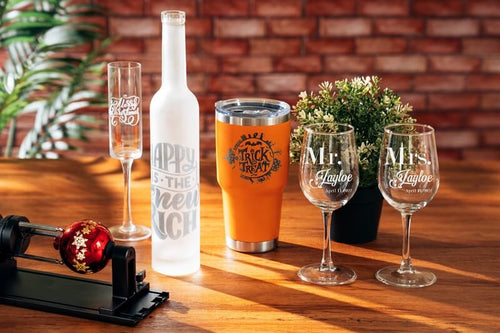
One of the standout features of the xTool P2 is its ability to engrave curved surfaces. The machine can automatically construct 3D models of objects and adjust the laser's focus accordingly, allowing you to etch curved glass with unparalleled accuracy.
The xTool P2 can also engrave cylindrical and spherical glass objects like wine glasses, champagne flutes, or beer mugs using the compatible xTool RA2 Pro rotary attachment.
Large Engraving Area and Automatic Passthrough for Versatility
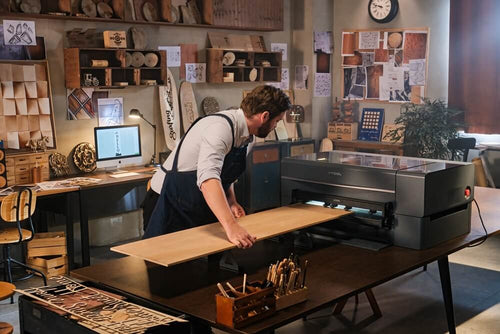
The xTool P2 boasts a large working area (23.6'' x 12.1''), making it suitable for a wide range of laser engraving glass projects. Additionally, its passthrough feature eliminates restrictions on the length of the object being etched, so you can work on glass pieces of longer size, up to 118 inches.
Safety Features to Protect Users and Workspace
The xTool P2 prioritizes safety with features like an enclosed design, light-filtering lid, an automatic lock on the lid, and an emergency button. Additionally, the machine offers exception warnings to alert users to potential issues and an optional fire safety kit for added protection.

XTOOL P2
CO2 Laser Engraver for Glass
Best desktop CO2 laser engraver that is safe and easy for home use. Especially ideal for business projects.
Learn MoreAdvantages of Laser Etching and Engraving Glass
Laser etching and engraving offer several advantages over traditional glass etching methods. Here are some of the key benefits of using lasers for glass etching:
Precision and Detail
Laser engraving machines are capable of producing incredibly intricate and detailed designs on glass surfaces. The focused laser beam is precisely controlled by a computer-guided system, often referred to as a CNC (Computer Numerical Control) system. This system translates digital designs into a set of coordinated movements for the laser, allowing it to follow the desired path on the glass surface with extreme accuracy.
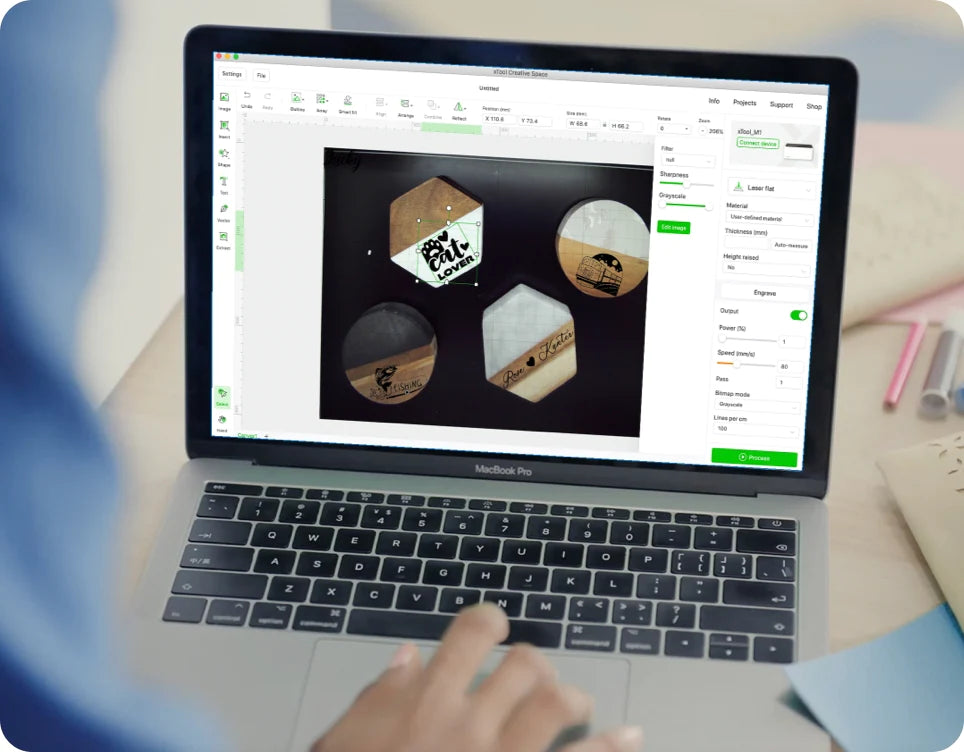
The laser's fine beam, combined with the precise movements directed by the CNC system, enables users to create complex patterns, images, and text that may be difficult or impossible to achieve with traditional etching methods.
Furthermore, the user can adjust the laser's settings, such as power and speed, to achieve different effects, offering unparalleled control over the etching process.
Consistency in Reproducing Designs
As mentioned above, laser etching machines are computer-controlled, which means that designs can be easily replicated with exact precision, making them ideal for producing multiple identical pieces or large-scale projects.
Speed and Efficiency
The laser etching process is typically faster than traditional methods, as the laser beam can move rapidly across the glass surface.

XTOOLF1
Fastest Portable Diode Laser Engraver for Glass
With its max. engraving speed of 4,000mm/s and handheld design, f1 excels at on-site engraving projects.
Learn MoreMinimal Material Waste
Since laser etching and engraving remove only a small amount of material from the glass surface, there is minimal waste generated during the process.
This makes it an environmentally friendly option compared to methods like sandblasting, which can produce a significant amount of dust and debris.
Environmentally Friendly Process
Unlike acid etching and glass etching creams, laser etching does not involve the use of harmful chemicals. This makes it a more environmentally friendly option, as there is no need to worry about chemical disposal or potential damage to the surrounding environment.
How to Laser Engrave Glass?
Here is a step-by-step guide on how to laser engrave glass:
Step 1: Preparing the Glass
Thoroughly clean the glass surface to remove any dust, dirt, or fingerprints that might interfere with the etching process. Use a glass cleaner and a lint-free cloth for best results.
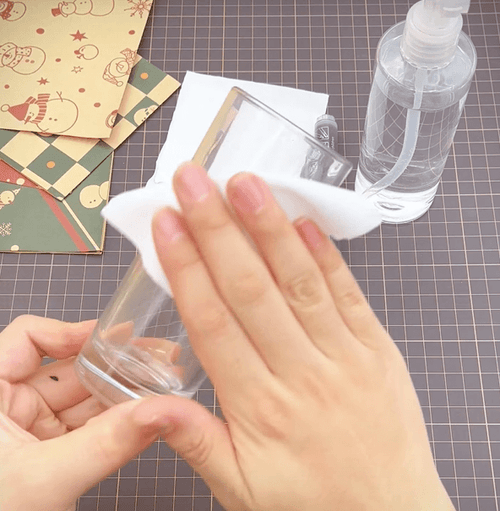
If a diode laser engraver is used, an additional pretreatment step for the glass is required, as its wavelength is not readily absorbed by the glass surface.
This pretreatment process typically involves applying a specialized coating or marking paper to the glass, which helps the diode laser to effectively etch or engrave the glass surface.


XTOOLF1
Fastest Portable Diode Laser Engraver for Glass
With its max. engraving speed of 4,000mm/s and handheld design, f1 excels at on-site engraving projects.
Learn MoreStep 2: Design Creation and Import
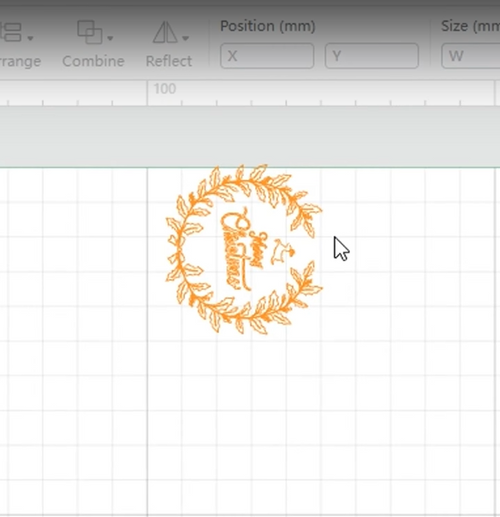
Create your design using graphic design software, such as Adobe Illustrator, CorelDRAW, or Inkscape to create your design or import an existing image. Save your design in a compatible file format, like PNG, SVG or DXF, and import it into the laser engraver software.
Need design inspiration? Browse our free laser projects center.

Step 3: Choosing the Right Laser Speed and Power Settings
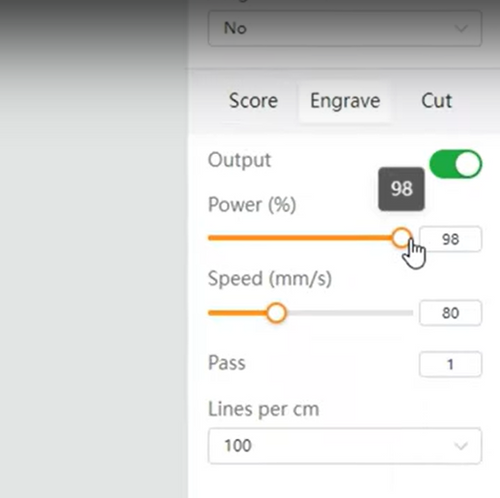
Engraving settings determins the result of the project. To make this step simple, xTool's software has built-in preset parameters for various materials.
For example, if you're using xTool P2, the 55W CO2 laser, to engrave a 4mm plain white glass sheet, the optimal laser engraving settings are 10% power and 300mm/s speed.
Step 4: The Etching/Engraving Process

Place the glass on the laser engraver's worktable. If you are engraving a glass cup, attach it to the rotary attachment.
Adjust the focus of the laser head. This step is crucial for achieving clean, sharp etching lines.
Once everything is set up and ready, start the laser etching/engraving process.
Step 5: Post-etching/engraving Cleanup and Finishing Touches
Wipe the etched surface with a damp cloth to remove any residual dust or debris from the etching process. If necessary, use a mild glass cleaner for a thorough clean.
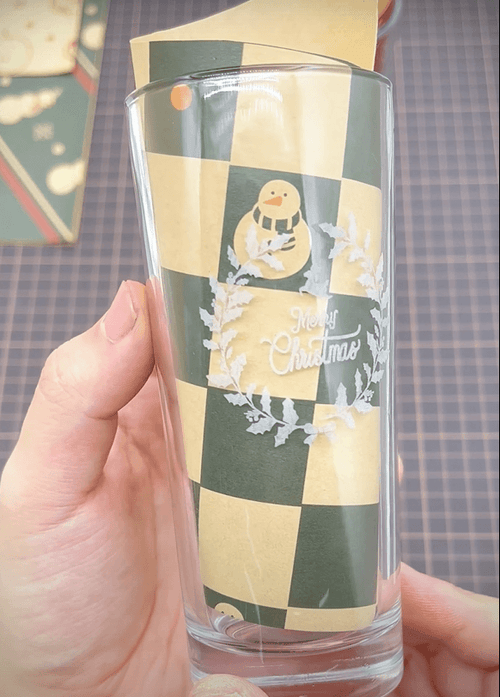
Top Glass Laser Engraving and Etching Ideas
Laser etching and engraving open up a world of creative possibilities for transforming ordinary glass items into personalized and unique works of art. Here are some inspiring glass etching ideas:
Personalized Glasses
Create personalized wine glasses, champagne flutes, beer mugs, or whiskey decanter with personalized designs, such as monograms, logos, or meaningful quotes. These make great gifts for weddings, anniversaries, or housewarming parties.
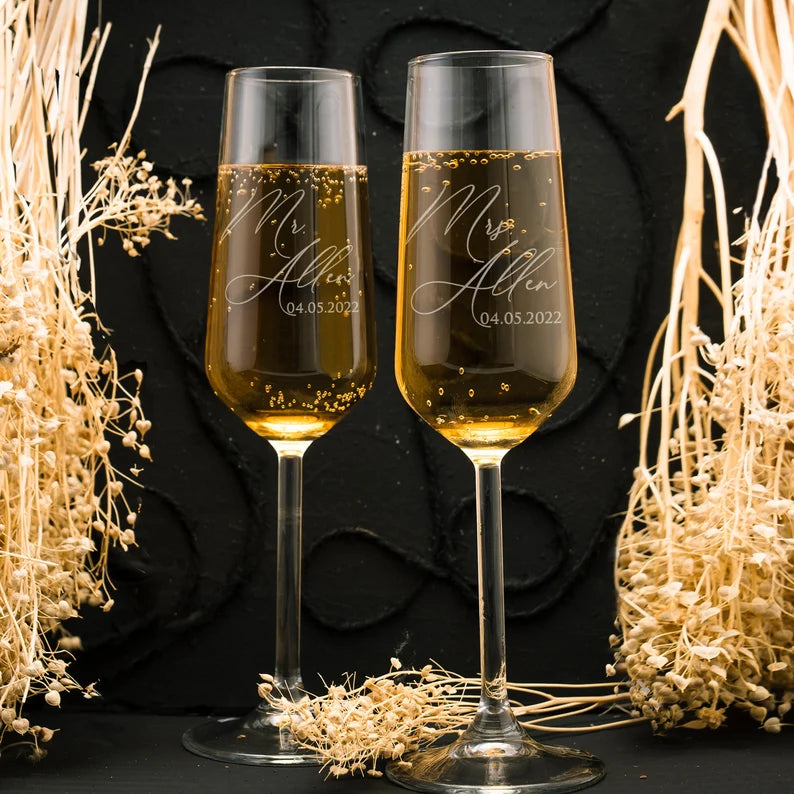

XTOOLF1
Fastest Portable Diode Laser Engraver for Glass
With its max. engraving speed of 4,000mm/s and handheld design, f1 excels at on-site engraving projects.
Learn MoreCustom Engraved Glass Trophies and Awards
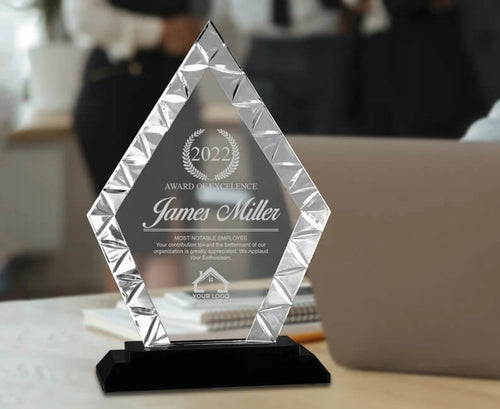
Design and produce custom glass awards and trophies for corporate events, sports competitions, or academic achievements. Incorporate company logos, event details, and recipient names for a truly personalized memento.
Etched Glass Pictures
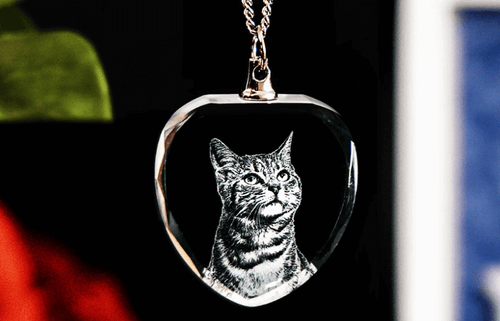
Transform ordinary glass into a work of art with laser etched glass pictures. Capture cherished memories, beautiful landscapes, or intricate designs on glass surfaces. The precision of laser engraving brings intricate details to life, making these etched glass pictures a stunning addition to any home or office decor.
Engraved Glass Ornaments
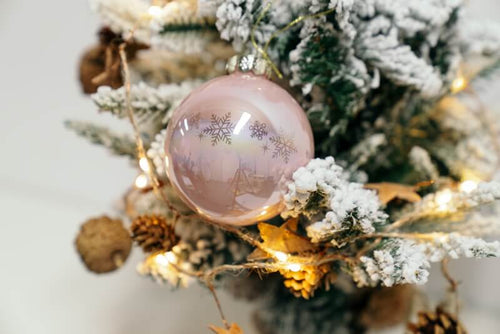
Design and produce custom glass ornaments for holidays, special occasions, or home décor. Etch seasonal designs, personal messages, or intricate patterns to create a unique and eye-catching decoration.
Laser Engraved Mirrors
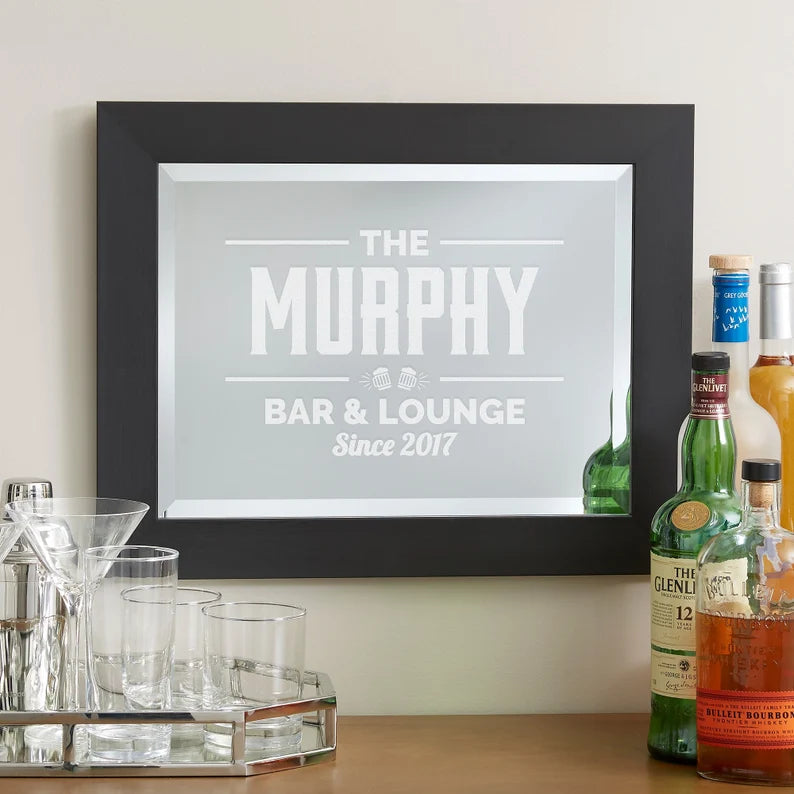
Enhance the beauty of mirrors by etching intricate patterns or artistic designs around the border or directly onto the mirror surface. Laser engraved mirrors can add a touch of elegance to any home décor.
Personalized Laser Etched Glass Photo Frames
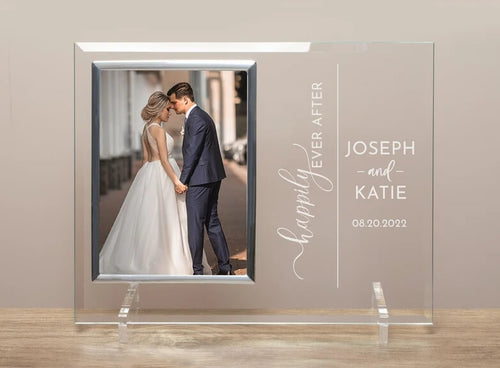
Engrave decorative borders, patterns, or meaningful quotes onto glass photo frames to give them a personal touch. These make thoughtful and memorable gifts for friends and family.
Customized Glass Jewelry Organizers
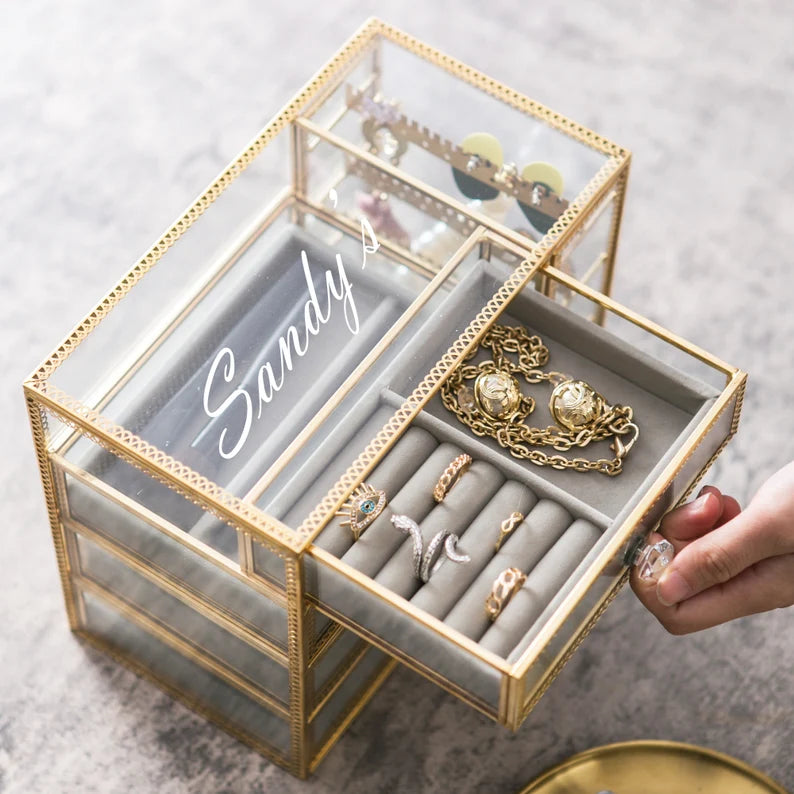
Keep your jewelry organized in style with customized laser engraved glass jewelry organizers. Laser engrave personalized patterns, names, or special messages onto glass jewelry boxes or trays. These elegant and functional organizers not only safeguard your precious pieces but also add a touch of sophistication to your dressing area.
Engraved Glass Candle Holders
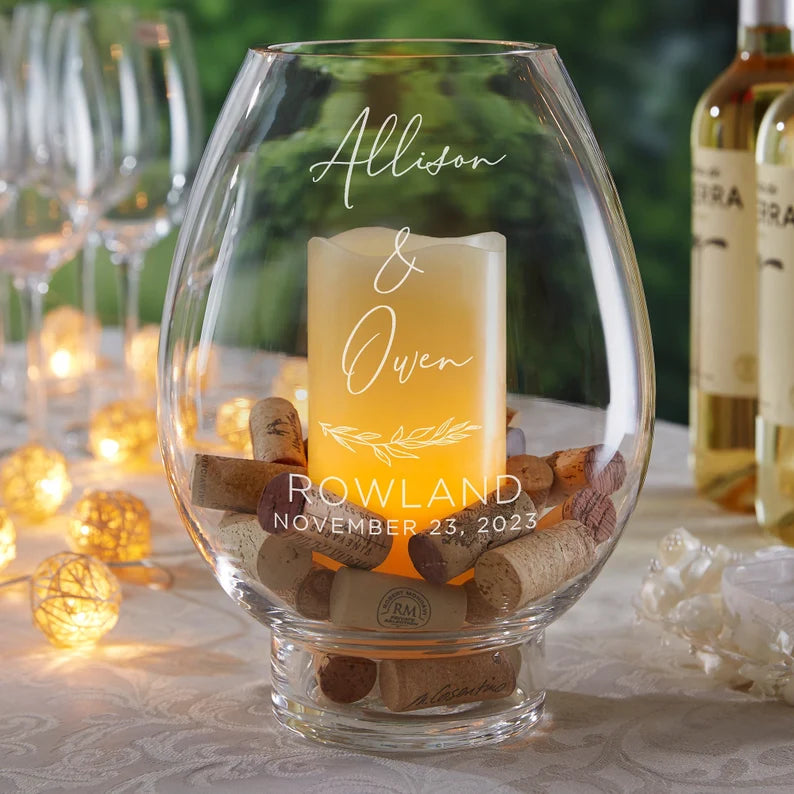
Create a warm and inviting ambiance with engraved glass candle holders. Laser engraving allows for intricate patterns, monograms, or custom designs to adorn the glass surface. When the candle inside is lit, the enchanting patterns and personalized messages shine through, making these candle holders perfect for special occasions or everyday decor.
Engraved Glass Flower Vases
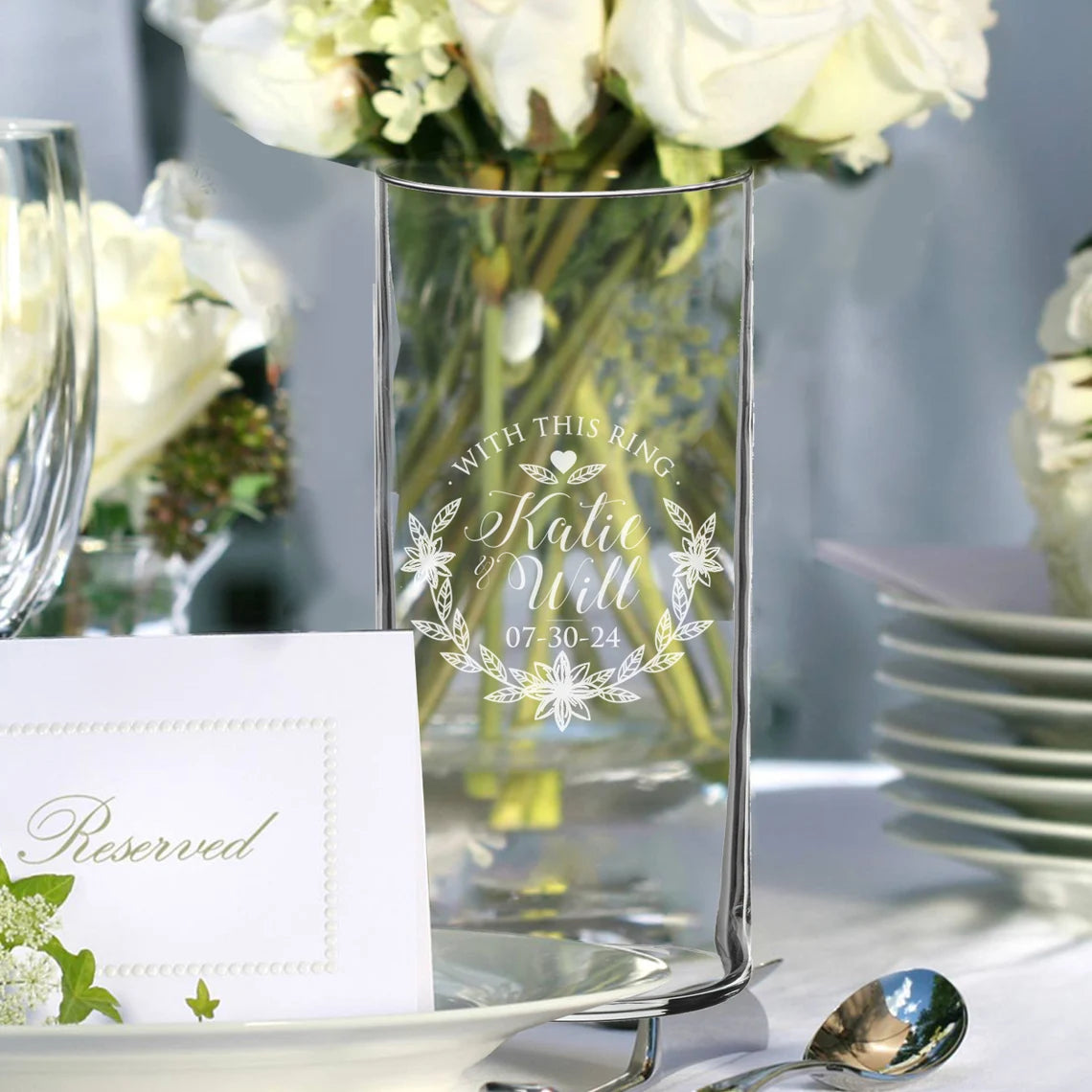
Elevate your floral arrangements with engraved glass flower vases. Laser etching can transform plain glass vases into exquisite pieces of art. Whether it's a wedding centerpiece, a gift for a loved one, or a stylish addition to your home, these vases add a touch of elegance to any bouquet.
Personalized Engraved Jars
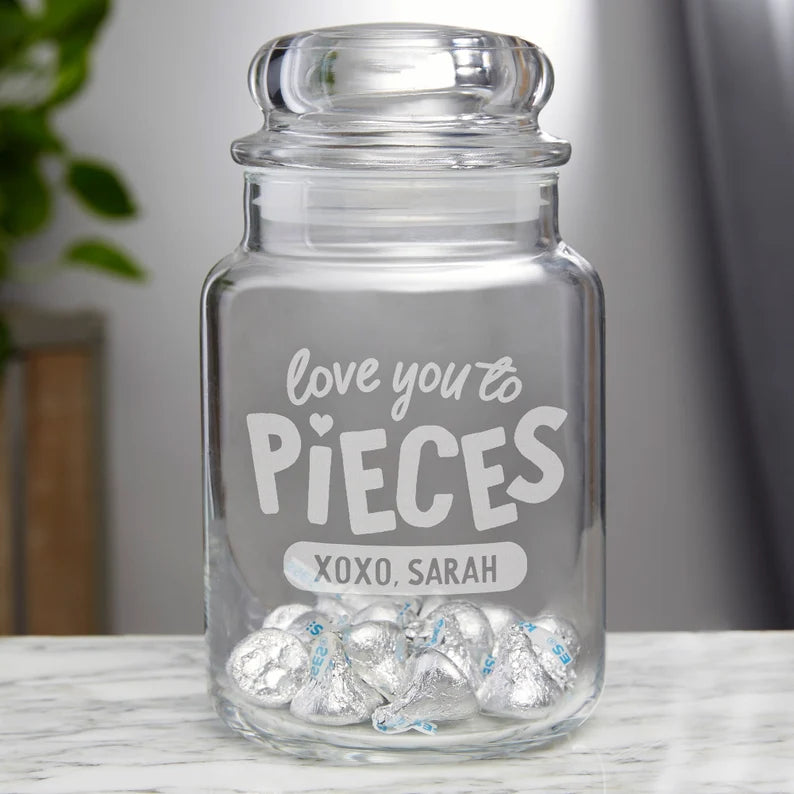
Give your kitchen a personalized touch with engraved glass jars. Laser engrave labels, contents, or decorative motifs onto glass containers for spices, pantry items, or storage jars. Not only do these jars help keep your kitchen organized, but they also add a unique and customized flair to your culinary space.
Personalized Engraved Perfume Bottles
Indulge in luxury with personalized engraved perfume bottles. Laser etching allows for intricate designs and custom monograms to adorn the glass surfaces of perfume bottles. These bottles make for exquisite and memorable gifts, showcasing both the fragrance inside and the thoughtfulness of the personalized engraving on the outside.
FAQs of Laser Etching and Engraving Glass
Q1: What Type of Laser Engraver Can Etch/Engrave Glass?
CO2 laser engravers are most commonly used for etching glass. Diode laser engravers can also be used, but they require additional pre-treatment of the glass surface.
Q2: Can a Diode Laser Engrave Glass?
It's possible to engrave glass with a diode laser. However, you need to apply a coating, such laser marking paper, to the area to be engraved before engraving.
Q3: Can a Fiber Laser Engrave Glass?
Fiber laser engravers cannot engrave glass. They can engrave metal, plastic, stone, and ceramic, etc.
Q4: Can All Types of Glass be Laser Etched/Engraved?
Most types of glass can be laser etched, including float glass, crystal glass, colored glass, glass mirrors, and tempered glass.
Q5: Do I Need to Use Any Special Coatings or Treatments on the Glass before Laser Etching/Engraving?
For CO2 laser engravers, you can directly etch onto the glass without any special coatings or treatments. However, with diode laser engravers, you may need to apply a specialized coating to ensure proper absorption of the laser.
Q6: Can You Wash Laser Etched/Engraved Glass?
Yes, laser-etched glass is wash safe as the etching process creates a permanent design on the glass surface that is resistant to wear and tear.
Q7: Can Laser-etched Glass be Repaired or Removed?
Laser etching is a permanent process, and the design cannot be removed or repaired once it has been etched onto the glass surface.
Q8: How Deep is the Etching on the Glass?
Laser etching on glass is typically a surface-level process that creates a shallow, frosted appearance. The depth of the etching can vary depending on the power and speed settings of the laser engraver, as well as the type of glass being used.
Q9: Can I Engrave Glass that is Curved or Has an Irregular Shape?
Yes, it is possible to etch curved or irregularly shaped glass, although it may require special equipment or attachments, such as a rotary attachment, to accommodate the shape and ensure a consistent etching result. xTool P2 and xTool S1 can engrave on curved glass surface.
Q10: What is the Ideal Power and Speed Settings for Laser Etching Glass?
The ideal power and speed settings for laser etching glass can vary depending on the type of glass, the thickness, and the specific laser engraver being used. It is recommended to consult the manufacturer's guidelines or perform test etchings on scrap pieces of glass to determine the best settings for your project.
Conclusion
Laser etching glass is a versatile, precise, and efficient method for creating custom designs and personalizing various glass items. With numerous advantages over traditional methods, laser etching allows for intricate patterns, quick processing times, and minimal damage to the glass surface.
By choosing the right glass laser engraving machine, understanding the process, and exploring creative design ideas, you can elevate your glass etching projects and create stunning pieces of art or functional items for personal or commercial use.


